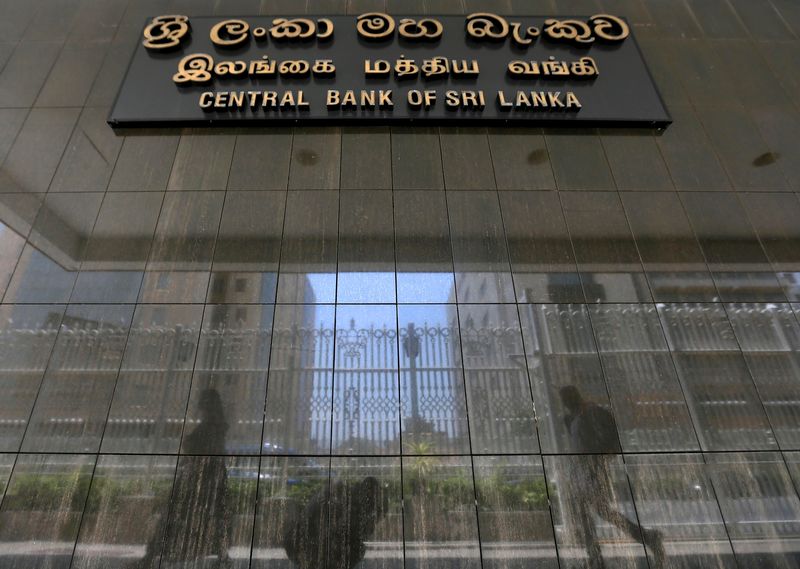By Uditha Jayasinghe and Swati Bhat
COLOMBO (Reuters) - Sri Lanka's central bank on Thursday threatened administrative intervention to control high market interest rates that it regarded as out of line with its policy rates and the outlook for falling inflation.
Any such action, interpreted by economists as a downward push, would cut high deposit rates and borrowing costs for business - and eventually, as depositors sought alternatives, for the government of the crisis-hit country.
The Central Bank of Sri Lanka (CBSL) also confirmed an expected decision to hold its two policy rates steady, citing a need to curb demand in the economy. The Standing Lending Facility rate was kept at 15.50% and the Standing Deposit Facility Rate at 14.50%.
"The Board noted with concern the anomalous rise in market interest rates, particularly deposit interest rates and short-term lending interest rates ..." the CBSL said in a statement announcing its policy decision.
"If an appropriate downward adjustment in the market interest rates would not take place in line with the envisaged disinflation path, the central bank will be compelled to impose administrative measures to prevent any undue movements in market interest rates," it said.
In a later press conference, CBSL Governor P. Nandalal Weerasinghe said challenges in government financing could be "managed with interest rates", indicating that the central bank wanted lower yields on public debt, too.
Market rates on government bonds and treasury bills are about twice as high as the policy rates for overnight money.
Business is suffering, too, from lending rates well above levels available before the country entered a severe economic crisis in March.
"The central bank has previously imposed caps and can do the same again but would prefer to let markets adjust and respond to the situation," Weerasinghe said. "Already, longer-term rates are trending down and that is positive."
FEAR OF A HAIRCUT
Interest rates on government securities are high in part because creditors fear debt restructuring will result in a haircut - partial cancellation of the obligations.
"The government has been borrowing even at the long end at rates above 30%, which could beg the question of a possible haircut being factored in at the decision," said Nikita Tissera, vice president, corporate advisory, at NDB Investment Bank.
"The decision to keep rates steady is also a way of signalling intent of lowering rates in the future".
Sri Lanka is talking with creditors about a debt restructuring that is necessary before receiving a much needed $2.9 billion bailout from the International Monetary Fund.
"We are confident the way discussions are going ahead we will get assurances (from creditors) soon," Weerasinghe said. "IMF board meetings happen every week, so if we miss December it's not a big deal. We can go to the IMF board in January."
The island nation has been struggling with soaring inflation driven partly by a shortage of foreign exchange that has limited supply of imports and undermined the currency. In response, the CBSL has raised policy rates by a record 950 basis points this year.
The central bank statement "is clear on CBSL wanting market interest rates to be on a downward path in the months ahead, citing moderation in inflation in particular," said Thilina Panduwawala, head of research at Frontier Research.
The nationwide consumer price index was 70.6% higher in October than a year earlier. But the CBSL expects that restrained fiscal policy, if sustained, and its tight monetary policy will pull the annual inflation rate down to 4% to 5% by the end of 2023.
Economic activity will recover gradually but sustainably, supported by envisaged improvements in supply conditions, improved market confidence, and the effect of measures to stabilise economic conditions, the CBSL said in its statement.
